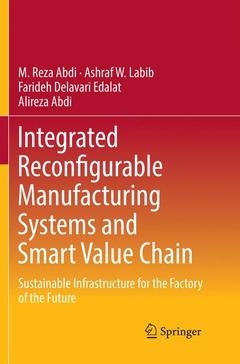Description
Integrated Reconfigurable Manufacturing Systems and Smart Value Chain, Softcover reprint of the original 1st ed. 2018
Sustainable Infrastructure for the Factory of the Future
Authors: Abdi M. Reza, Labib Ashraf W., Delavari Edalat Farideh, Abdi Alireza
Language: English
Approximative price 210.99 €
In Print (Delivery period: 15 days).
Add to cartPublication date: 02-2019
Support: Print on demand
210.99 €
In Print (Delivery period: 15 days).
Add to cartPublication date: 06-2018
Support: Print on demand
Description
/li>Contents
/li>Biography
/li>Comment
/li>
The book develops manufacturing concepts and applications beyond physical production and towards a wider manufacturing value chain incorporating external stakeholders that include suppliers of raw materials and parts, customers, collaborating manufacturing companies, manufacturing service providers, and environmental organisations. The focal point of the value chain remains as a manufacturing system and its operations whiles flows of parts/materials and information and services across the supply/value chain tiers are taken into account.
The book emphasises on the two innovative paradigms of Reconfigurable Manufacturing Systems (RMS) and the 4th industrial revolution (Industry 4.0) along with their incorporated development. RMS, as a relatively new paradigm, has been introduced to meet the requirements of ?the factories of the future?, which is aimed by Industry 4.0, though introducing greater responsiveness and customised flexibility into production systems, in which changes in product volumes and types occur regularly. Manufacturing responsiveness can be achieved by RMS through reconfiguring the production facilities according to changing demands of products and new market conditions. The book addresses challenges of mass-customisation and dynamic changes in the supply-chain environment by focusing on developing new techniques related to integrability, scalability and re-configurability at a system level and manufacturing readiness in terms of financial and technical feasibility of RMS. It demonstrate the expected impacts of an RMS design on operational performance and its supply/value chain in the current/future manufacturing environment facing dynamic changes in the internal/external circumstances. In order to establish a circular economy through the RMS value chain, an integrated data-based reconfiguration link is introduced to incorporate information sharing amongst the value chain stakeholders and facilitate grouping products into families with allocation of the product families to the corresponding system configurations with optimal product-process allocation.Decision support systems such as multi criteria decision making tools are developed and applied for the selection of product families and optimising product-process configuration. The proposed models are illustrated through real case studies in applicable manufacturing firms.
Chapter1. Introduction.- Part1. Concept and Application of Adaptive Water Management.- Chapter2. Review of the main water management approaches over the last century.- Chapter3. Conceptual Framework of Adaptive Water Management.- Part2. Water management in Developing countries- an empirical study in the Middle East, Iran.- Chapter4. Water management in developing countries: a case study of Iran.- Part3. The Case Study- Background to Greater Tehran and Methods of Data Collection.- Chapter5. The case study- background to Greater Tehran.- Chapter6. The Case Study- Methods of Data Collection.- Part4. Data Analysis Methodology- Evaluation of AWM framework.- Chapter7. Data Analysis Methodology.- Chapter8. Evaluation of polycentric governance.- Chapter9. Evaluation of organisational flexibility.- Chapter10. Evaluation of public participation.- Part5. Conclusions and Recommendations.- Chapter11. Review of the objectives regarding AWM adaptation.
M. Reza Abdi has a background in manufacturing engineering and industrial management, and holds a PhD in manufacturing engineering from University of Manchester Institute of Science and Technology (UMIST), and an M.Phil in manufacturing engineering and Industrial management from Liverpool University. Reza has over 15 years of teaching and industrial experience in various universities and manufacturing companies. His specialist areas are operations management, manufacturing system design, decision support systems, analytical hierarchical process (AHP), analytical network process (ANP), information systems, environment management, computer modelling, systems dynamics, simulation and fuzzy logic. He has published various articles and five book chapters in the areas of operations and information management, and been a chair person and a member of program committees of a number of international conferences in the area of operations and information management, and environment management. He has been a principal member of the Course Approval and Review Team (CART) at Bradford University.
Ashraf Labib is Professor of Operations and Decision Analysis at Portsmouth Business School. He has also been the Associate Dean (Research) of the Business School and Director of the DBA Programme. His main research interest lies in the field of Strategic Operations Management and Decision Analysis. This includes Manufacturing, Reliability Engineering and Maintenance Systems, Multiple Criteria Decision-Analysis and Applications of Artificial Intelligence such as Fuzzy Logic. Prior to joining Portsmouth Business School, he was a Senior Lecturer in the Manufacturing Division of the Department of Mechanical, Aerospace and Manufacturing Engineering at UMIST (University of Manchester Institute of Science and Technology). He holds a PhD and MSc from Univ. of Birmingham, an MBA from the American University in Cairo, and a BSc in Mechanical Engineering from Univ. of Cairo.
Presents a new integrated strategy of supply chain incorporating an RMS
Demonstrates how manufacturing facilities need to be (re)arranged for producing the product families according to their operational requirements at any production stage
Develops a reverse supply chain incorporating a circular economy required for a sustainable RMS value chain with efficient usage of resources




